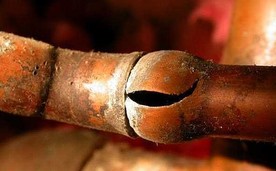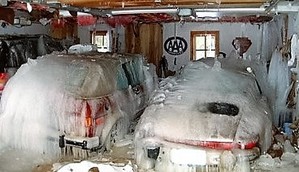Few things are less pleasant than a home plumbing problem during the winter season. These issues often arise when colder temperatures hit because when water freezes, it expands. A few simple precautions can prevent these problems and keep your home warm and dry.
Add Proper Insulation -- Insulation isn't just for attics; pipes that are exposed to the elements need insulation too. Use foam pipe insulation and insulation tape in any potential problem spots, including attics, crawl spaces, basements and other areas that aren't heated.
Care for Hoses -- Outdoor faucets and hoses are other potential weak spots. Protect hoses by rolling them up and storing them for the winter. Water left in hoses can freeze, expand and rupture the lining, and ice can travel up the hose and into the spigots.
Cover Spigots -- Protect outdoor spigots during the winter with insulating faucet covers. In particularly frigid weather, it may be best to close the shutoff valve to outdoor faucets to avoid any potential trouble. Remember to drain any pipes to deter freezing.
Drip Faucets -- If you're anticipating a big cold snap, turn faucets in the house to a slow drip. This will reduce the overall pressure on the water system and help prevent a catastrophic rupture.
Seal Drafts -- Cold drafts can help pipes freeze. To avoid this, find the areas in your house where pipes are exposed and insulate them. Then block cold air from getting inside by adding weather stripping or insulating foam.
Locate the Shutoff Valve -- Should the worst happen and a pipe does burst, make sure you know where your home's shutoff valve is, as well as how to turn it off quickly and efficiently.
ANDREW BACHMAN
West Hartford Gutter Cleaning // Owner
EMAIL [email protected]
OFFICE (860) 888-8472
ADDRESS 69 Talcott Rd. West Hartford, CT 06110
Add Proper Insulation -- Insulation isn't just for attics; pipes that are exposed to the elements need insulation too. Use foam pipe insulation and insulation tape in any potential problem spots, including attics, crawl spaces, basements and other areas that aren't heated.
Care for Hoses -- Outdoor faucets and hoses are other potential weak spots. Protect hoses by rolling them up and storing them for the winter. Water left in hoses can freeze, expand and rupture the lining, and ice can travel up the hose and into the spigots.
Cover Spigots -- Protect outdoor spigots during the winter with insulating faucet covers. In particularly frigid weather, it may be best to close the shutoff valve to outdoor faucets to avoid any potential trouble. Remember to drain any pipes to deter freezing.
Drip Faucets -- If you're anticipating a big cold snap, turn faucets in the house to a slow drip. This will reduce the overall pressure on the water system and help prevent a catastrophic rupture.
Seal Drafts -- Cold drafts can help pipes freeze. To avoid this, find the areas in your house where pipes are exposed and insulate them. Then block cold air from getting inside by adding weather stripping or insulating foam.
Locate the Shutoff Valve -- Should the worst happen and a pipe does burst, make sure you know where your home's shutoff valve is, as well as how to turn it off quickly and efficiently.
ANDREW BACHMAN
West Hartford Gutter Cleaning // Owner
EMAIL [email protected]
OFFICE (860) 888-8472
ADDRESS 69 Talcott Rd. West Hartford, CT 06110


 RSS Feed
RSS Feed
